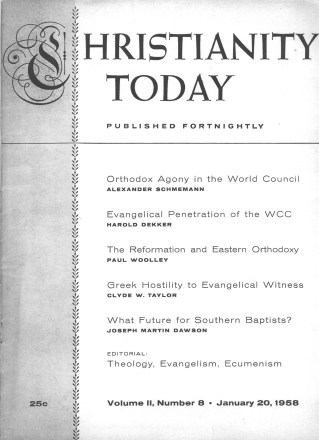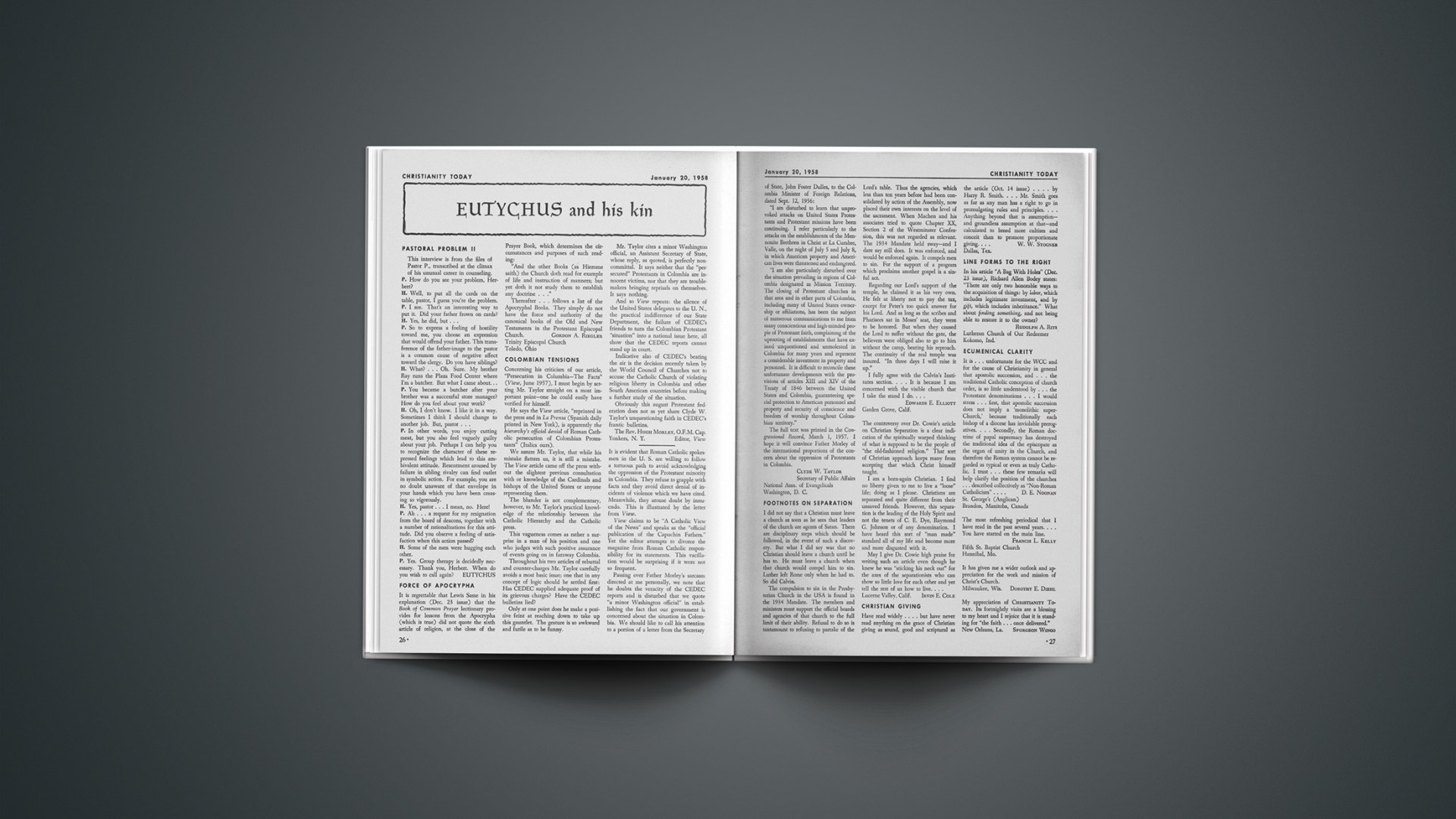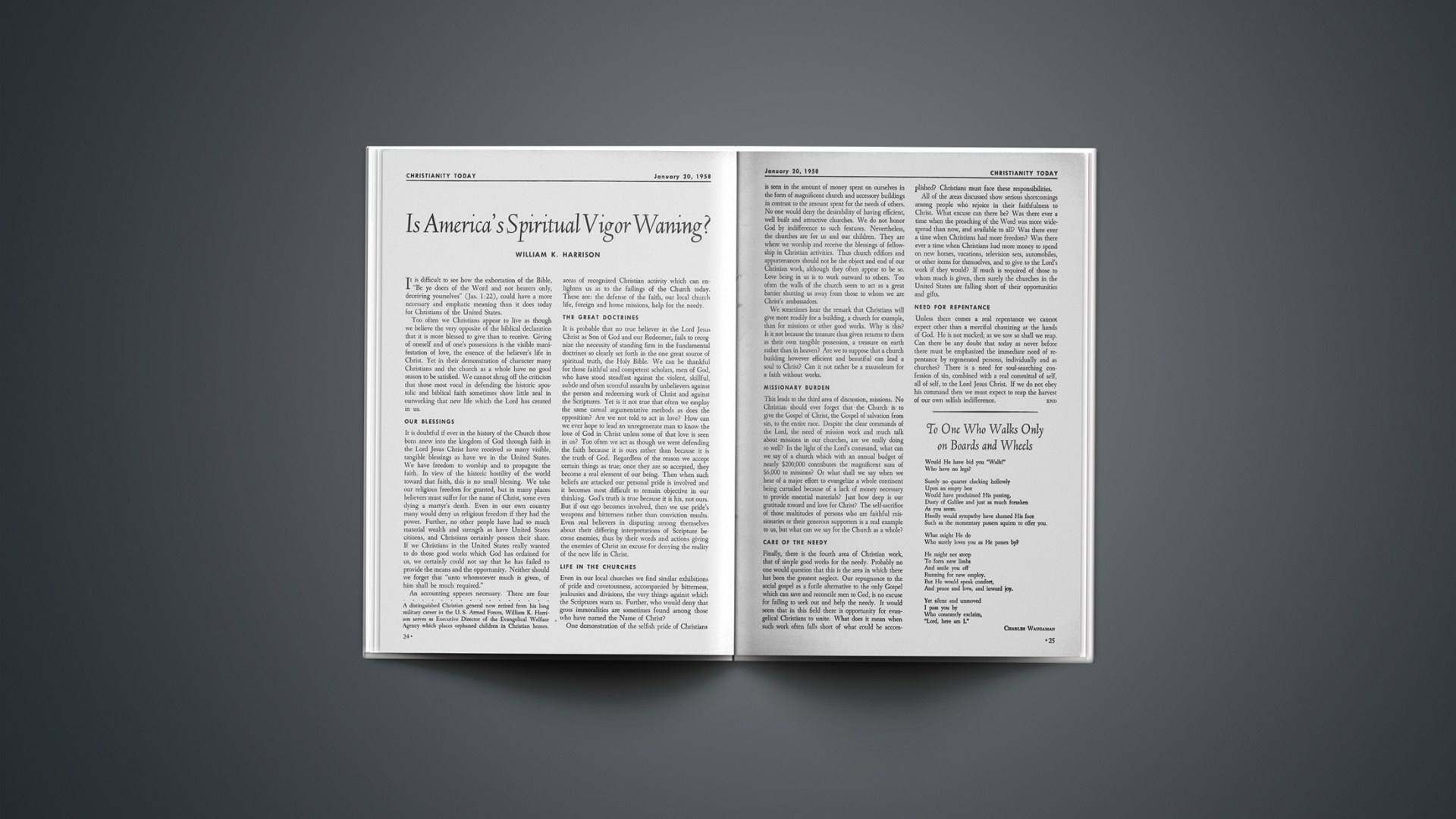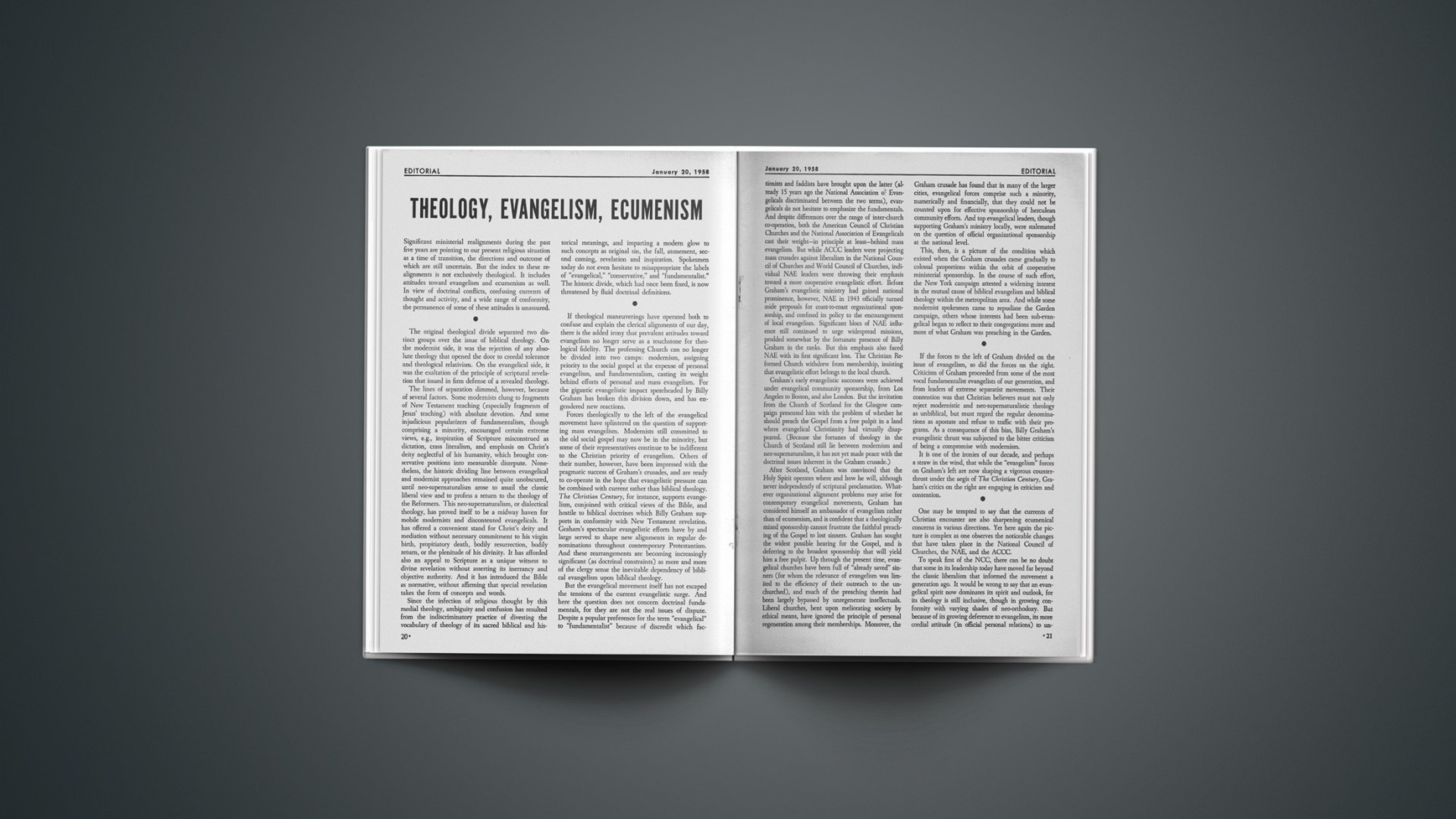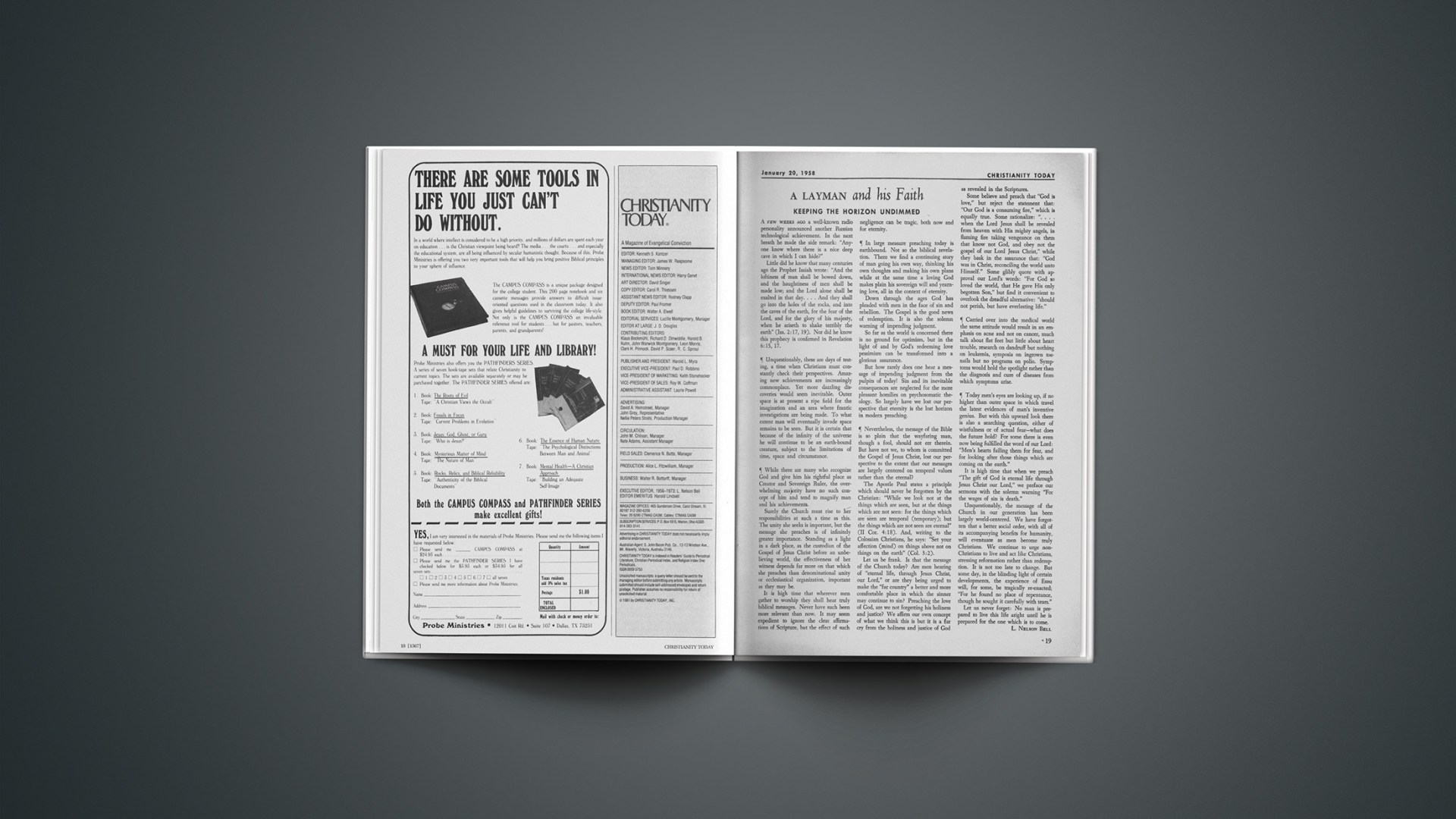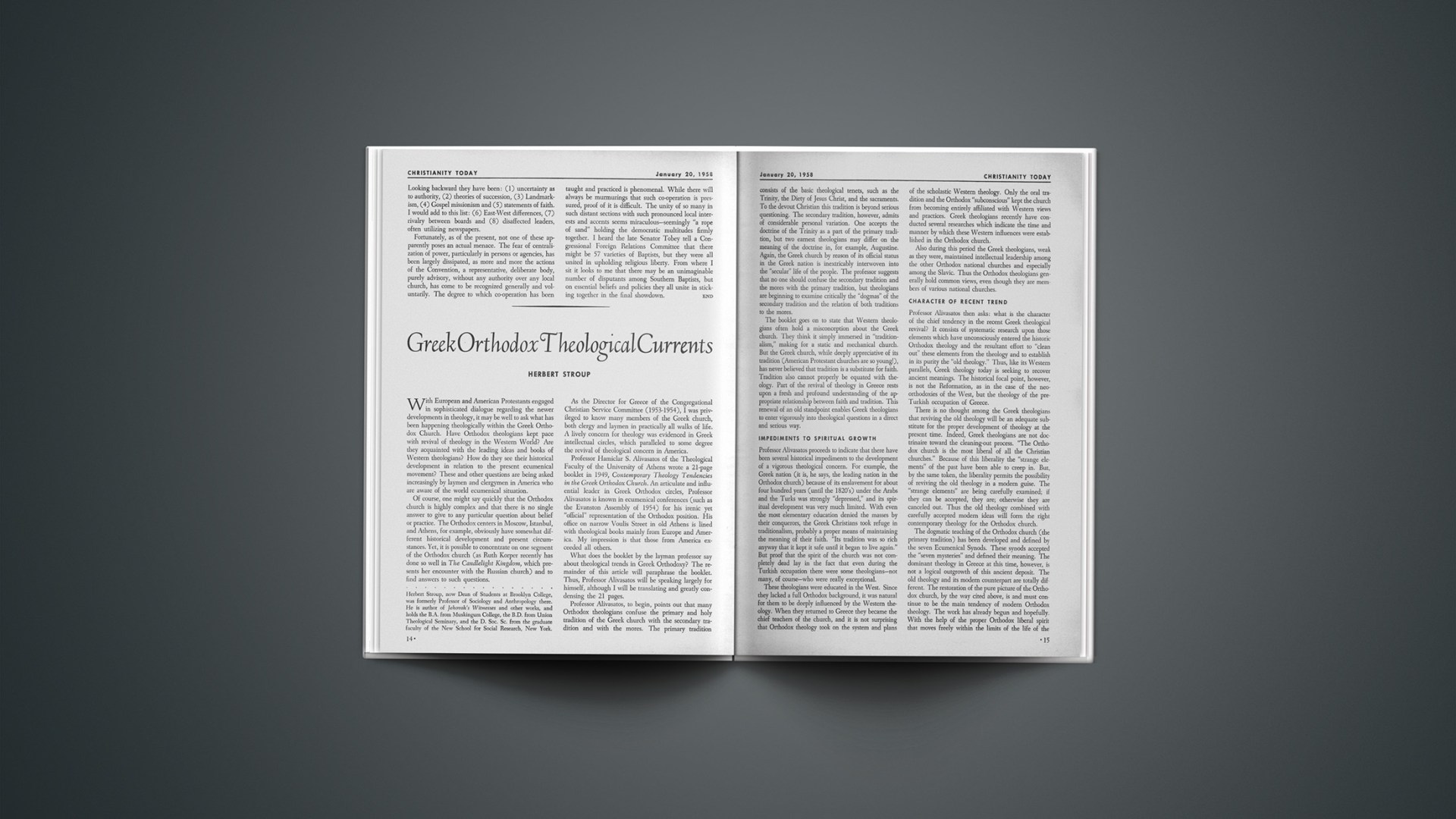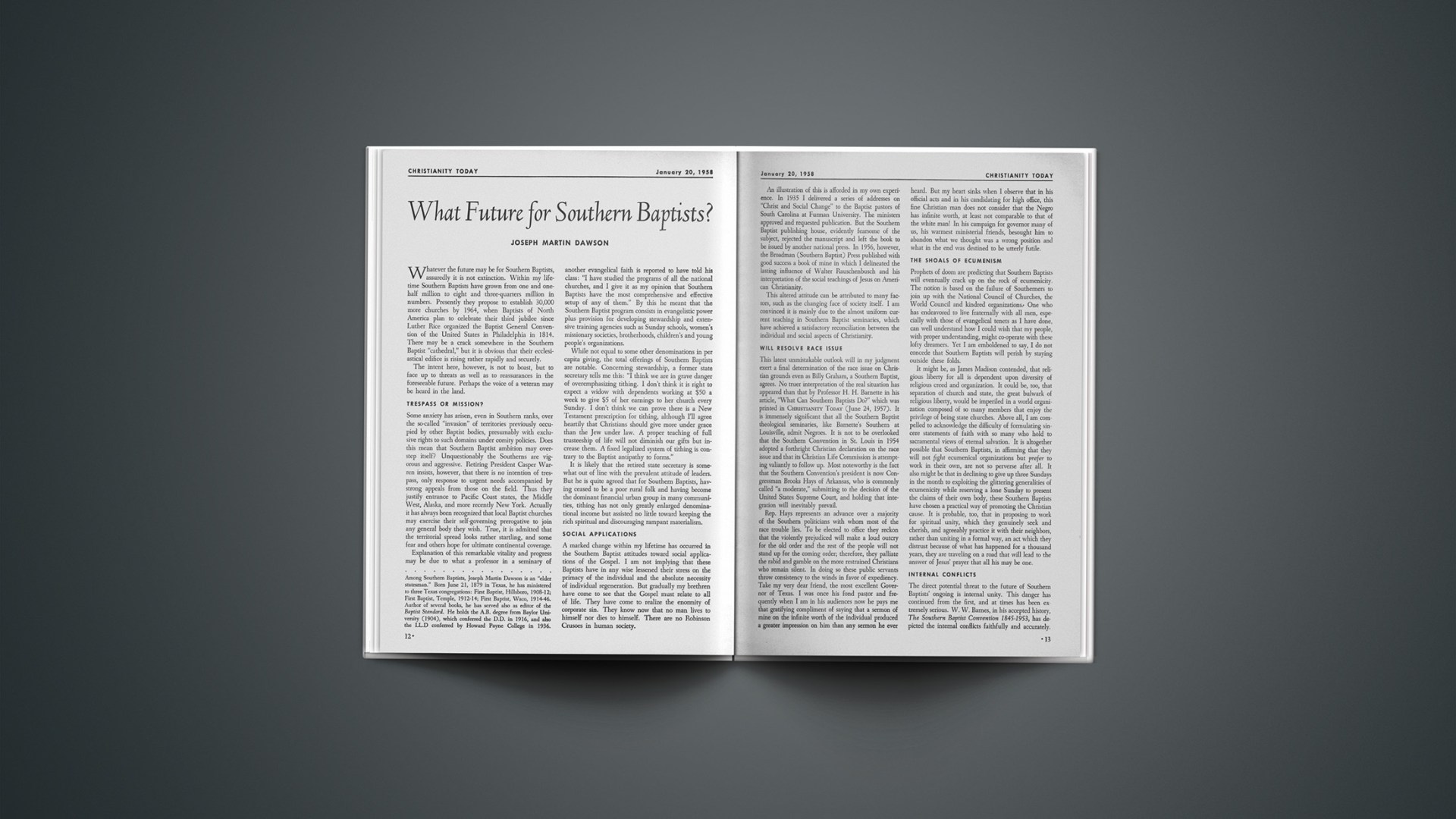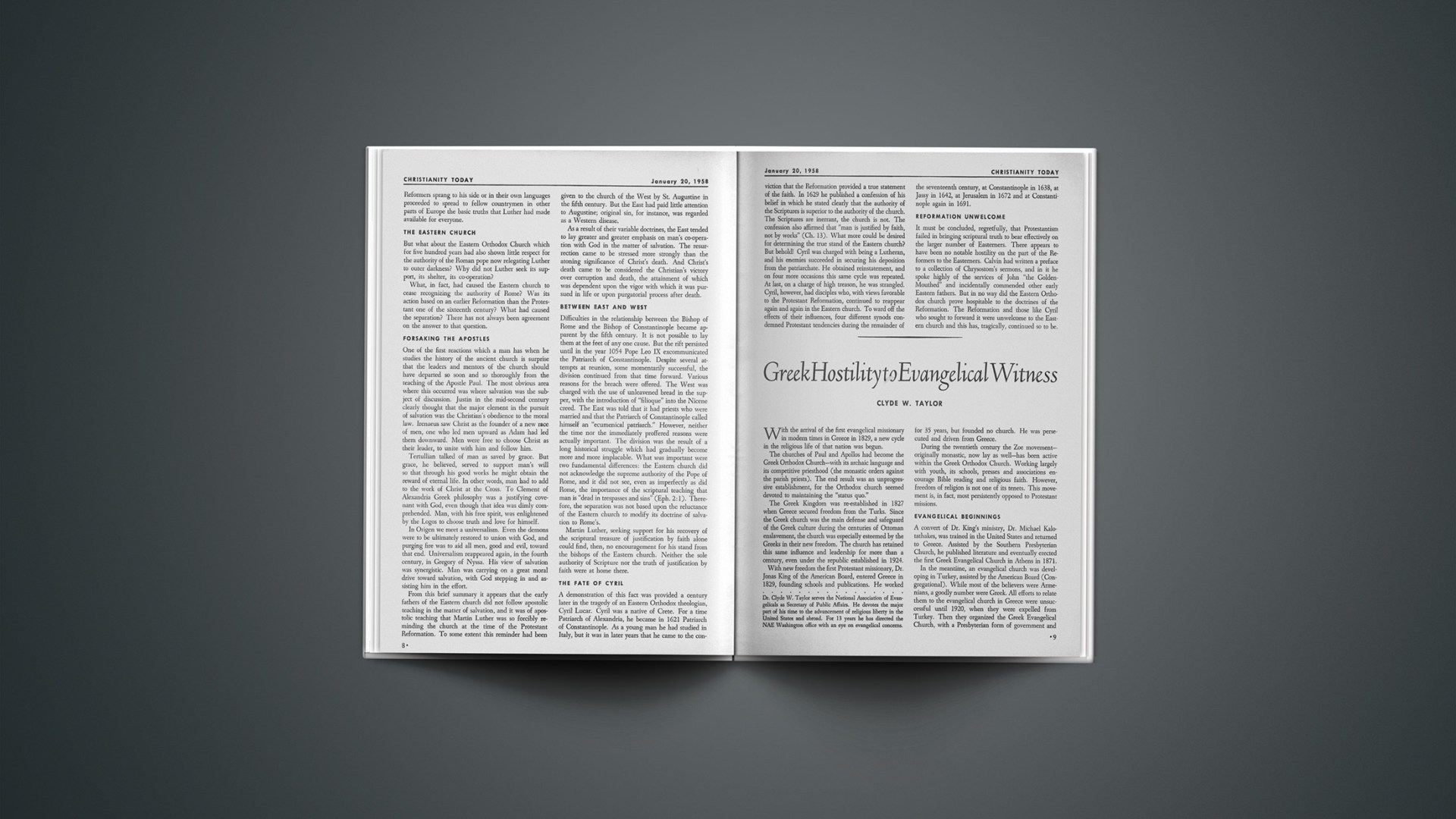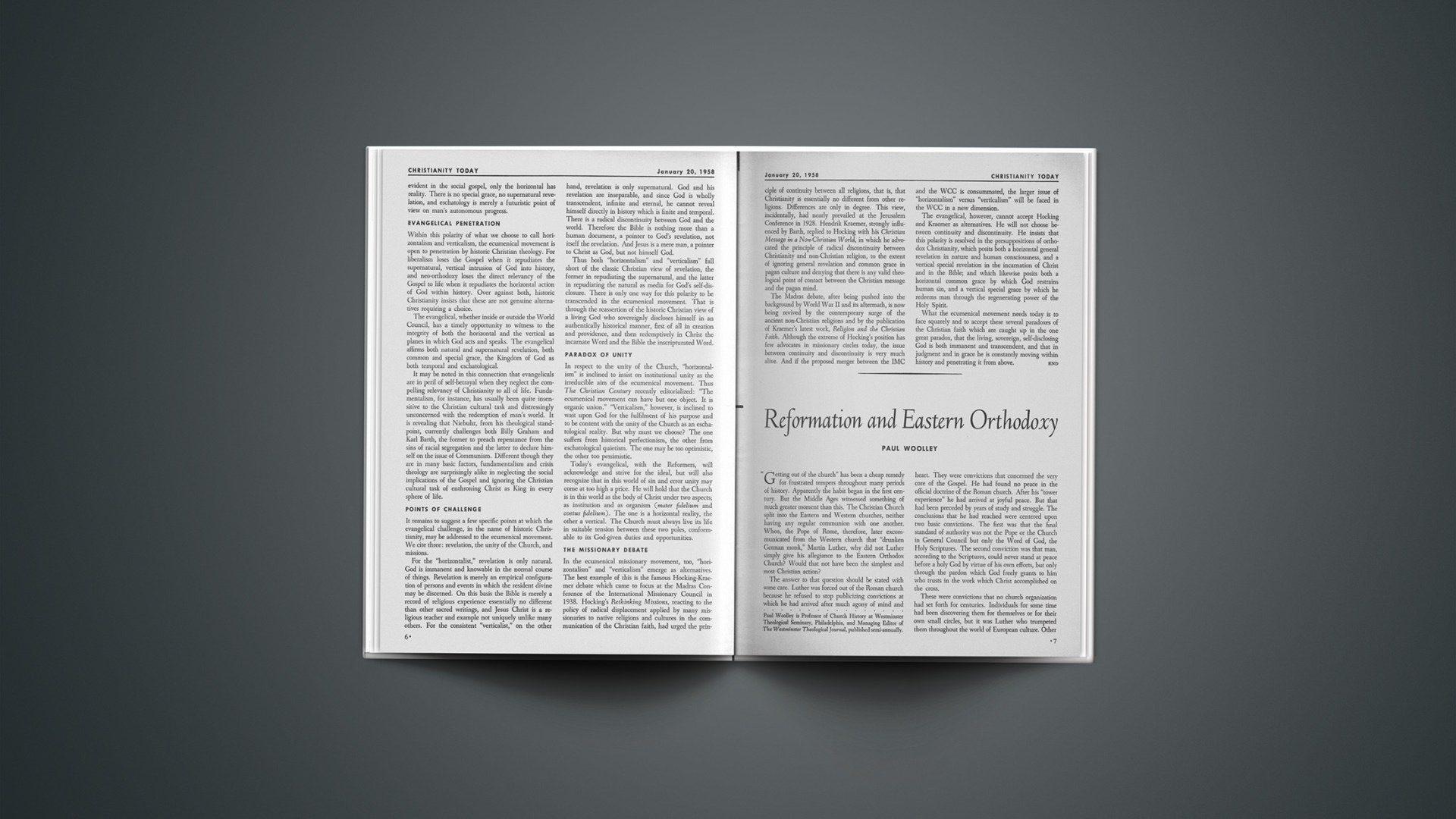Christianity in the World Today
The most potent organizational foe of Roman Catholic infractions in the United States today is the group known as Protestants and Other Americans United for Separation of Church and State. Its leaders and backers include some of the most influential men in American Protestantism.
POAU first won widespread recognition in 1947 with its “Manifesto” which warned that the Roman Catholic hierarchy was trying to divide state-supported public schools into sectarian school systems sustained out of public revenue. Its warning was prompted by devotion to a constitutional principle which provides that religious and governmental functions stay clear of each other.
Two years later Paul Blanshard, the special counsel for the POAU, followed up the warning. His book raised a cry which is still ringing in bookstore cash registers. American Freedom and Catholic Power in its original edition sold 240,000 copies and was the most vigorous revelation of Roman Catholic plans and principles ever to come before the American public. The book still is selling at the rate of about 300 copies a month.
A Ten-Year Review
This month the POAU reviewed the accomplishments and the frustrations of the past ten years. Tacked on to its “balance sheet” were three questions which organization leaders said should be addressed to every Catholic candidate for the United States presidency or vice presidency.
Is the POAU against the Catholics as a whole?
Blanshard himself took another look at the situation in American Freedom and Catholic Power, 1958 edition, scheduled for publication March 12. He carefully restated the POAU policy of not being against Catholicism per se, but only as the church hierarchy would tend to violate the Constitution.
The book states, “It should be noted that I have not included in my suggestions for a resistance movement any anti-Catholic political party or any general boycott of Catholic candidates for public office … However, we cannot avoid the further conclusion that a Catholic candidate’s attitude toward certain policies of his church is clearly relevant to his fitness to hold public office.”
Blanshard also came up with three questions which he felt should be asked of a Catholic presidential candidate. Two were the same as those prescribed by the POAU: (1) Do you approve or disapprove of your church’s directive (Canon 1374) to American Catholic parents to boycott our public schools unless they receive special permission from their bishops? (2) What is your personal conviction concerning your bishops’ denouncement of the Supreme Court’s interpretation of the religion clause of the First Amendment, the payment of government funds to parents for major parochial school costs, and the payment of tax money for such fringe benefits as bus transportation?
Blanshard’s third question would ask: Do you personally approve or disapprove of your church’s policy of denying both Catholics and non-Catholics the right to receive birth control information?
Blanshard said he would also be willing to put before Catholic presidential aspirants the POAU’s third query: If you became president what would be your policy concerning the appointment of an American ambassador or a personal representative to the Vatican?
POAU Also Considered It
Dr. C. Stanley Lowell, associate director of the POAU, said the organization leaders had considered Blanshard’s birth information question, but that some objections were raised.
(CHRISTIANITY TODAY suggested editorially, June 24, 1957 [Vol. I, No. 19], that when seeking the nation’s highest office a Catholic candidate be asked whether he shares the official view of the hierarchy that the state is the temporal arm of the Vatican. Lowell agreed that such a question would be “a rather good one.” Blanshard’s comment was, “I would not phrase it that way.”)
But why bring it up now? Political conventions are two and a half years away. Said the POAU, “… We believe that it would be unfortunate to postpone the discussion of these issues until personal factors have become paramount in a presidential campaign.”
What Is A Grant?
A group of taxpayers pointed to a 13-acre slum area in New York’s Lincoln Square section as the latest battleground in the separation of church and state issue. The taxpayers went unsuccessfully to the New York State Supreme Court to try and block what they viewed as a city fund grant to Fordham University, a Roman Catholic school.
City plans include condemnation proceedings against the blighted blocks and an auction sale as part of a $205,000,000 redevelopment project. Fordham wants part of the land for a collegiate center. The rest would be left for housing and commercial building.
State Supreme Court Justice Owen McGivern heard arguments from the taxpayers on the contention that the city is paying more than $16 a foot for the property for resale to Fordham at $7 a foot. A suit filed by the group sought to prevent the resale to the university on the grounds that such action would in reality be “a direct subsidy to a sectarian institution.” The group contended that this would amount to violation of federal and state constitutional guarantees of separation of church and state.
Fordham’s attorneys called the suit an attack on the university’s right to contract legally with the city as guaranteed in the Fourteenth Amendment of the Constitution. They also argued that a court decision preventing them from buying the land would have violated the school’s rights to full exercise of religious freedom as provided by the First Amendment.
McGivern dismissed the taxpayers’ suit with a ruling that sale of the land to Fordham would not involve any “gift or subsidy.” He implied that although the university would get the land for less than the city pays for it, additional costs would be involved. Fordham would be left with the task of relocating tenants and tearing down buildings before it could make use of the land. McGivern said any other educational institution was welcome to bid on the property.
Harris L. Present, attorney for the taxpayers’ group, was not through. He took the case to the appellate division and planned to appeal “to the United States Supreme Court if necessary.”
Convention Planned
The 14th World Convention of Christian Education will be held in Tokyo August 6–13. Related events will extend throughout the summer.
The Camel’S Nose
The presidents of 28 Jesuit colleges and universities have asked to have private schools included in any federal aid to education designed to increase United States scientific talent.
They announced after a two-day meeting in Washington the establishment of a national Jesuit Commission on Research and plans for $102,000,000 in new college buildings.
The president of the Jesuit Educational Association, the Rev. Edward B. Rooney of New York, said that if the objectives of increasing the teaching of science and mathematics can be attained only through federal aid, “then that aid should be made available on an across-the-board basis, for all students and for all institutions.”
“Where because of state constitutional provisions such across-the-board distribution is precluded, provision should be made for direct grants by the federal government to individuals and institutions affected,” Father Rooney said.
The Jesuit school heads claimed that the federal school lunch program provided a precedent for giving assistance directly to students without ragard to the private control of the school attended.
Imc-Wcc Merger Voted
The International Missionary Council Assembly voted to merge with the World Council of Churches.
Approval of a plan of integration came at a meeting of 200 delegates from 35 constituent councils of the IMC at Achimoto in the new country of Ghana.
Ratification by the constituent councils still is needed before the merger can be consummated.
The assembly recommended that the next WCC Assembly, scheduled for Ceylon in 1960, be postponed until 1961 to allow IMC constituent councils more time to study the merger plan.
The Assembly nominated James K. Mathews, executive secretary for India and Pakistan of the Methodist Board of Missions, to succeed Dr. Charles W. Ranson as general secretary of the IMC.
Bishop J. E. Leslie Newbigin, head of the Madhurai-Ramned diocese of the Church of South India, was named to succeed Dr. John A. Mackay, president of Princeton Theological Seminary, as chairman of the IMC. Mackay was made honorary chairman.
The Assembly admitted three additional councils to IMC membership.
People: Words And Events
Church Sponsors Jazz Movies—The St. Matthew’s Episcopal Church in Glendale, Mo., is sponsoring free showings of jazz movies in the City Hall. Comment will be given by the Rev. Alvin Kershaw, Episcopal rector of Peterboro, N. H., who won $32,000 on a television program with his knowledge of jazz.
New Journal Published—A new quarterly journal known as Foundations, the Baptist Journal of History and Theology, began publication this month as “an open forum for the expression of the theological conviction of Baptists.” Editor is the Rev. George Younger, Minister of Mariners’ Temple, New York. The journal’s initial issue contains an article entitled “Twenty Years A Baptist,” by Dr. Carl F. H. Henry, editor of CHRISTIANITY TODAY.
Skyscraper Church Planned—Trinity Methodist Church of Louisville, Ky., authorized its trustees to plan a $2,000,000 skyscraper building to house both a new church and 200 one-bedroom and efficiency apartments.
Free Organs Offered—Retired Cleveland businessman Claude Foster offered to buy a Hammond organ for any “poor country church” in Ohio that needs one and that does not have the funds to buy it.
Editor Dies—Louis Minsky, managing editor of Religious News Service, died at his Kew Gardens, N. Y., home at the age of 48.
Love Aflame—In Arlington, Va., Perry W. Johnson and Florence Edna Gutridge showed up for their New Year’s Eve wedding an hour late and found the church dark. Still determined, they happened upon the Rev. U. N. Troutman in a fire house. The couple walked down an “aisle” formed by two parked fire trucks and were pronounced man and wife in the waning moments of 1957.
Attendance Increases—One million more adults attended church and synagogue services regularly during 1957 than the year before, the American
Institute of Public Opinion reported. Dr. George Gallup, Institute Director, said an audit showed average weekly attendance in the United States at about 48,500,000.
Crime Rate Up—There were more crimes committed in the United States in 1957 than in any previous year, said J. Edgar Hoover, Director of the Federal Bureau of Investigation. Hoover said preliminary figures from police departments showed an increase of 7½ per cent over 1956, when 2,563,000 major crimes were committed.
Translations Planned—Through Gates of Splendor, account of the martyrdom of five American missionaries, is being translated into the languages of Finland, Holland, Germany, Japan, Norway and Sweden.
Lutherans Triumph—The Lutheran Laymen’s League float won first prize in the religious category of the Tournament of Roses parade at Pasadena, California.
Digest—Canadian Prime Minister John G. Diefenbaker will address the fifth Baptist Youth World Conference in Toronto next summer.… President Eisenhower sent greetings to the Church of the Nazarene on the opening of its golden anniversary year.… The Manhattan Baptist Church was organized as the first New York City church affiliated with the Southern Baptist Convention.… Some 120 United States Methodist ministers and laymen will participate in a 10-day evangelistic crusade in Cuba, January 28-February 6.… Youth for Christ International announced plans for a five-year expansion program with a half-million-dollar-a-year budget to “combat juvenile delinquency by reaching teenagers with Christian teaching.…” Protestant churches in the New York City area opened a 13-week church attendance campaign to be climaxed on Easter Sunday as a follow-up to the Billy Graham crusade.… Wake Forest College trustees rejected a motion to permit campus dancing in violation of a North Carolina Baptist Convention ruling.
Students Confer
Not all college students go home for the holidays. At least nine thousand spent their Christmas vacations at religious conventions.
At Urbana, Illinois—Evangelist Billy Graham warned 3,200 delegates at the fifth International Student Missionary Convention that this may be the last generation for world evangelism.
“I have a feeling that as God called the disciples and the early church to evangelize in the first generation of church history, so you and I may be the ones God has called to evangelize the world in its last generation,” Graham said.
He told the gathering sponsored by Inter-Varsity Christian Fellowship that the delegates represented a potential missionary force to shake the world. He urged them to make “a full, irrevocable commitment to Christ.” More than 1,500 did.
The theme of the convention on the University of Illinois campus was “One Lord—One Church—One World.” In addition to Graham there were five other major speakers: Dr. Harold J. Ockenga of Boston, Dr. Donald Grey Barnhouse of Philadelphia, Dr. Masumi Toyotome of Tokyo, Japan and Dr. Kenneth Strachand and Rev. Israel Garcia of San Jose, Costa Rica.
Ockenga declared that missions were “the world’s first line of defense against atheistic Communism and against irresponsible freedom.”
But he stressed that “Christians must view the world through other glasses than the East-West struggle. We must recognize the value of all men regardless of color, creed and nationality in their condition of human need.
“The overpopulation, undernourishment, disease, lack of sanitation, illiteracy, ignorance, superstition, prejudice, hatred and corruption have bound mankind in darkness and fear. Compassion and concern are the twin motives which stir us.”
At Lawrence, Kansas—Some 3,400 students attending the sixth quadrennial Methodist Student Conference heard themselves called the “uncommitted generation.” They promptly admitted the designation, then dropped the blame back in the laps of accusing clergymen.
Delegates representing some 1,000 colleges and universities adopted a statement at the close of the conference which declared that the youths belong to an “uncommitted generation” because “the church has not called us to her Lord or her mission clearly enough to excite our response.”
The youths denied “the implication we are uncommitted either through choice or indifference.” “To the contrary,” the statement said, “most of us are deeply concerned over our lack of commitment and many of us are actually searching for that cause to which we can offer unreserved allegiance.”
Their statement was read by Dr. Robert Hamill of Madison, Wisconsin, director of the Wesley Foundation at the University of Wisconsin.
The statement said that the church which chides them for their uncommitment “proves to be a major stumbling block toward commitment.” The students said that although the church offers herself as the only institution worthy of their allegiance “it is herself a primary deterrent.”
“We may be silent and withdrawn, but we are not easily misled,” the statement continued. “The church as she stands now is not, we believe, worth our lives. But the mission of the church obedient to her Lord is. The institution does not impel our commitment, but the Lord of the institution does.”
All that the church has called on youths to do, the students said, “is to perpetuate the peripheral role in which she is presently engaged, while the urgent issues of the world remain unchanged. Some wonder if all she offers is just contentment, the antithesis of a commitment.”
The students said they were faced with a “curious dilemma” of wanting to commit themselves while the church offers no “clear reason” for them to do so.
“We ask the church to recommit herself more fully to her true Lord and mission that we may have more reason to heed her call.”
Among conference speakers were Norman Cousins, editor of the Saturday Review; Methodist Bishop Fred P. Corson of Philadelphia and Dr. Harold A. Bosley, Evanston, Illinois, Methodist minister.
A highlight of the meeting was the world premiere of an oratorio, “The Invisible Fire,” commemorating the 250th anniversary of the birth of famed hymn writer Charles Wesley.
At Lexington, Kentucky—Some 2,500 delegates to a Southern Presbyterian youth meeting were told to hold on to spiritual perspectives in spite of the growing “scientific mood.”
The occasion was the sixth quadrennial Youth Convention sponsored by the Presbyterian Church in the U. S. (Southern).
Church-State Issues Summarized
The issue of separation of church and state promised to create continued tensions. Here is a summary of developments around the turn of the year:
WASHINGTON—Catholic presidential candidates should be asked to reveal their position on the clash in principles between the Roman church and democratic government, urged Protestants and Other Americans United for Separation of Church and State. (Story on page 28.)
NEW YORK—A state Supreme Court judge refused to block the proposed sale of public land at a discount to Fordham University, a move which a group of taxpayers view as a government grant to a sectarian institution. (Story on page 28).
WASHINGTON—Jesuit college heads asked that private schools be included in any future program of federal aid to education designed to increase this nation’s scientific talent. They said precedent has already been set for such action by the federal school lunch program. (Story on page 29.)
WASHINGTON—The Census Bureau decided to drop the idea of asking a question on religious affiliation in the 1960 Census. Bureau Director Robert W. Burgess said it was decided to forego the proposal primarily because “a considerable number of persons would be reluctant to answer such a question …” Burgess said the feeling was that the value of statistics based on the religion question would not be great enough “to justify overriding such an attitude.”
STOCKHOLM—The Swedish Minister of Justice undertook a new study of church-state relations in anticipation of a Parliament bill which would allow women to apply for office in the Lutheran National Church. Involved is the larger question of whether the church synod has the right to veto bills regarding church matters. The synod rejected a similar bill last fall.
The church has been challenged today by the “scientific mood,” said Dr. M. M. Heltzel, pastor of the Ginter Park church in Richmond, Virginia. But he added that science cannot, and was never intended to, meet all of our many needs.
“In a world of atomic energy and man-made satellites we see that science, if unrestricted, could be our destruction,” he warned. “Now we see that some power outside man, from beyond the forces of nature, must be brought upon the scene to prevent disaster.”
Heltzel’s contentions won support from the pastor of Trinity Presbyterian Church in Charlotte, North Carolina, Dr. Lawrence I. Stell, who said that the church’s primary need is to aid students in resolving “the seeming conflict between Christian faith and scientific method.”
“There are some who rejoice in attempting to develop a wide chasm between these two and demand that the student choose between them,” said Stell. “This can be based only on a misreading of the nature of the two.”
Other speakers included Dr. Julian Price Love, professor of biblical theology at Louisville Presbyterian Seminary, and Dr. Chandran Devanesen, head of the history department, Madras Christian College, Tambaran, India.
President Worships
President Eisenhower was among high government officials who attended an early morning National Presbyterian Church service which marked the opening of a new session of Congress.
He was joined by members of Congress, the cabinet and service officials.
The service of intercession and Holy Communion was conducted under the auspices of the Presbyterian Church of the USA, the United Presbyterian Church, the National Council of Churches and the Council of Churches of the National Capital Area.
The Communion sacraments were served by elders of the National Presbyterian Church, among whom are Secretary of State John Foster Dulles and Secretary of the Army Wilbur Brucker.
Lawmakers Pray
The United States Senate reconvened as Chaplain Frederick Brown Harris, D.D. prayed that the nation’s leaders may “rise to greatness of vision and action to meet the most crucial challenge since the Liberty Bell first rang out its glad tidings.…”
Brown prayed in behalf of the senators that the Lord would “give thy servants, the few out of the many, who for the nation speak and think and act here, to see clearly that our salvation will not be found by wailing about the things we might have done, but by the mighty things we here highly resolve to do today for the tomorrow.” His prayer continued:
“Purge our outlook of all defeatism and despair; and above all, of the perilous fallacy that the final victory of thy truth which makes men free depends on the massing of material might alone. Deliver us from the evil of seeking deals which crucify ideals.”
Seminary Land Acquired
A 100-year-old family estate was purchased to become the site of the new Midwestern Baptist Seminary at Kansas City, Missouri.
The Southern Baptist Convention’s sixth seminary will be located on 99 acres which cost the trustees $252,000. The site is the largest of the six.
Former owner of the property is Mrs. Sheffa Vivion Foster, who said she would will an additional five acres to the seminary.
“Religion” Jails Youth
Because he said his religious scruples forbade him to use electricity or other modern conveniences, a young conscientious objector was sentenced to a year and a day in jail.
Abraham Y. Bontrager, 24-year-old member of the Old Order Amish community at Hazleton, Iowa, was sent to a federal penitentiary after he refused to accept alternative work assigned to him by his draft board in lieu of military service.
Bontrager refused three alternatives offered by Federal Judge William J. Campbell: work in hospitals either in Des Moines or Fort Wayne, Indiana, or work on a farm at a Mennonite home for the aged in Kansas.
Bishop Emanuel Schrock of the Amish community, who appeared in court with the youth, said employment in a public place or use of any modern convenience, such as electricity, was forbidden by the sect’s religious beliefs.
Judge Campbell said he had to decide “whether the defendant is exercising his religious beliefs within reason.”
Gospel Radio For Nome
The Evangelical Mission Covenant Church said it would assume responsibility for securing a broadcast license and installing equipment for a Gospel broadcasting station at Nome, Alaska.
The announcement came after a meeting in Chicago between church officials and representatives of Denali Broadcasters, Inc., which also has wanted to erect such a station for Western Alaska.
Denali and other evangelical organizations will be given opportunities to assist in the missionary radio effort in Alaska.
The Evangelical Mission Covenant Church has been studying the possibility of building a radio station in conjunction with its mission operations in Northwestern Alaska for several years.
Industrialist Ordained
Robert B. Watts, vice president and general counsel of the Convair Division of the General Dynamics Corporation, was ordained to the priesthood of the Episcopal Church in Los Angeles.
A Change Of Mind
The Detroit Common Council voted to ban Sunday real estate operations then, a week later, reversed itself.
Votes on the proposed ordinance, which was to undergo further study, climaxed seven weeks of debate involving church groups, home builders and estate men.
Councilman James H. Lincoln originally introduced the bill “so salesmen won’t have to work seven days a week.” A Michigan law in effect since 1846 forbids “any manner of labor, business or work” on Sunday, but the law in recent years has not been enforced.
A previous ban on Sunday real estate sales was ruled out by the state Supreme Court in the 1930’s.
The Common Council first passed Lincoln’s bill by a vote of 4 to 3.
But Councilman Charles N. Young-blood, who favored the ban, asked for reconsideration because, he said, it was controversial and it was passed on the eve of the swearing in of two new members.
The second time around the Council reversed the ban by a vote of 5 to 3.
Middle East
Oil And The Gospel
The nationalization of the oil industry in Iran brought unprecedented gains in the proclamation of the Gospel.
The old Anglo-Iranian Oil Company had exercised control over the region in which it operated to such an extent that Christian workers were discouraged.
Avoiding religious controversy was the company’s chief interest. Any stirrings might have halted the flow of oil.
Chaplains paid by the company were the only recognized Christian clergy. These chaplains, representing the Catholic and Anglican Churches and the Church of Scotland, were imported to minister solely to the foreign employees. Iranian Christians were for the most part leaderless and allowed to use chapels occasionally. Oil workers found themselves in a materialistic environment, among them Armenian and Assyrian Christians and others who had received Christian training in mission schools.
Efforts in the name of Christ were few. The Christian and Missionary Alliance had a missionary couple in Khorramshahr and Ahwaz for five years and a Lebanese couple lived in the area for a few years as free-lance missionaries. Large missions of Iran were unable to station any missionaries or evangelists in that region.
Then came the establishment of the consortium, the nationalization of the oil industry. Formal chaplaincies were abolished and restraints of long standing also went.
Iranian evangelicals and new technicians from the United States began insisting on some form of Protestant church organization. The Bishop of Iran, the Rev. W. J. Thompson of the Church Missionary Society, took the lead by inviting the Presbyterian Mission in Iran to join in a survey of the possibilities for a joint chaplaincy in the Province of Khuzistan.
That was two years ago. Since then, evangelical missionary couples with a knowledge of the Persian language have come into take up the challenge. They have brought Christians together and have created interest among non-Christians in a manner unparalleled in Khuzistan.
Although the couples serve as members of their own denominational missions on loan to the Chaplaincy Committee, their salaries are met entirely from local sources.
F.T.W.
New Church
Presbyterians decided to establish a church in Hawaii against the advice of the Honolulu Council of Churches and findings of Dr. J. Quinter Miller, Assistant General Secretary of the National Council of Churches.
The Rev. Carroll Schuster, Clerk of the Los Angeles Presbytery, said persons are being sought to organize the Hawaiian church.
Honolulu church leaders said this was in violation of a “gentlemen’s agreement” dating back to the 1840s between the Congregationalists and the Presbyterians. The agreement reportedly provided that Presbyterians would operate elsewhere in the Pacific area, and that Hawaiian Presbyterians join other Protestant denominations.
The Honolulu Council of Churches is on record as having written the Presbyterian National Board of Missions and the Presbytery of Los Angeles to the effect that there were already enough denominations located in the Hawaiian Islands.
Miller made a survey on the islands several months ago at the request of the board. “While I found a wide variety of opinion thereon,” he said, “the conclusion to which current thought and opinion points is that it would be unwise for Presbyterian work to be established there.”
His survey said such a move would “inescapably weaken, by division, the work of the Hawaiian Evangelical Association of Congregational Christian Churches.” The Congregationalists have been in Hawaii since 1820 and list today more than 100 individual churches with nearly 13,000 members.
Thomas C. Major, president of the Honolulu Council of Churches, promised at any rate to “welcome them (the Presbyterians) with open arms and invite them to join the council.”
P.E.T.
Europe
Pastors Attacked
Communist leaders appeared to be changing their tactics in a campaign to undermine the strength of East German churches.
The latest maneuver in the Soviet cold-war offensive saw direct attacks against individual clergymen instead of open assault upon entire religious movements. More pastors were being arrested and others denounced publicly.
Leaders of the Evangelical Church in Germany quickly sensed the change and issued direct orders to its 5,500 pastors in the East Zone to stay with their congregations—even at the risk of their personal safety.
The orders came as ministers by the dozens sought to move out of Communist East Germany. Some 20 pastors under suspicion for alleged anti-State propaganda already had fled to the West and another 150 were reported to have asked for reassignment outside the Red satellite nation.
The Evangelical Church in an effort to stem the tide, took disciplinary action against two of its pastors who fled the East Zone and reportedly refused to return, even at the urging of church leaders.
South America
Growing Tension
Growing tension between the Roman Catholic Church and Venezuelan Dictator Perez Jimnez was highlighted in an article published recently in La Republica, Costa Rican daily, in which it was revealed that Archbishop Rafael Arias Blanco had sent the dictator a note demanding legal elections as scheduled December 15.
“The peace and happiness of the Venezuelan people,” the archbishop said, “demand the return of the exiled, the liberation of all political prisoners, and full amnesty.”
President Perez’ reply was to confiscate the edition of the Catholic daily La Religion, in which the note was subsequently published, and to secure from his congress a bill authorizing the substitution of a simple plebescite for regular elections.
Venezuelans may vote in December for or against continuation of the present regime.
The current attitude of the Venezuelan clergy is reminiscent of the fact that it was the opposition of the Catholic church in Colombia which finally tipped the scales against former dictator Rojas Pinilla.
W.D.R.
Japan
Conference Expands
The Central Committee of the Japan Protestant Centennial Conference decided to expand its scope by including Japanese pastors and Christian workers as well as missionaries.
Six Japanese church leaders agreed to form an executive committee.
To date 21 missions including 643 missionaries have accepted invitations to participate in the centennial celebration.
Founding Marked
Japanese government officials were among participants in a service which commemorated the 80th anniversary of the founding of Meiji Gakuin High School and University.
The Meiji Gakuin school traces its formal history to the founding in 1877 of a theological school under the sponsorship of Reformed and Presbyterian missionaries from Scotland and the United States.
Tokyo officials and representatives of the federal Ministry of Education helped to observe the anniversary.
J.A.M.


